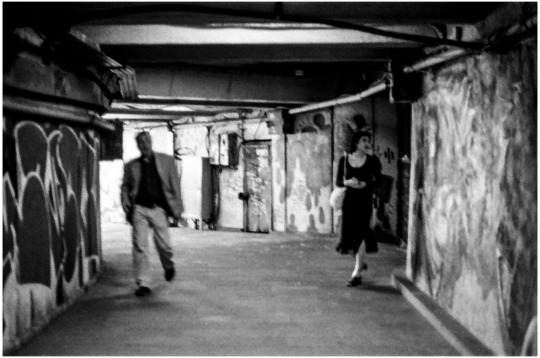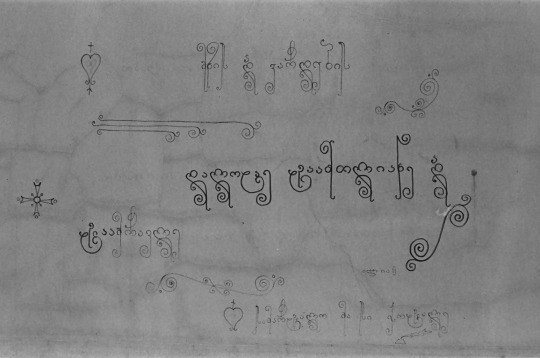#black tbilisi
Photo
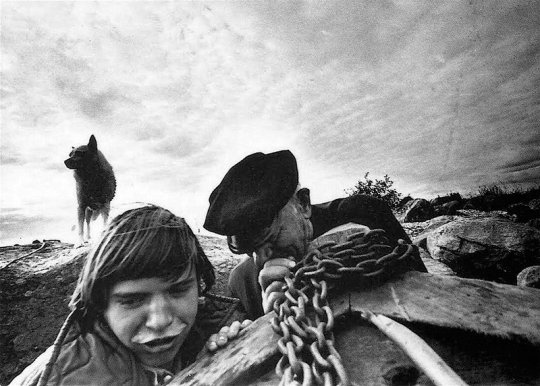
Vitas Luckus. Tbilisi, Georgian USSR. 1981
Follow my new AI-related project «Collective memories»
#BW#Black and White#Preto e Branco#Noir et Blanc#黒と白#Schwarzweiß#retro#vintage#Vitas Luckus#Tbilisi#Georgia#USSR#Soviet union#1981#1980s#80s
40 notes
·
View notes
Text

Black, black, and some more black.
#my outfits#outfit#fall outfit#fashion#all black everything#all black#a.w.a.k.e. mode#materiel tbilisi#leather trench coat#leather pants#minimal style#loewe
21 notes
·
View notes
Text

#In the National Art Gallery#Photo by Sigizmund Kropivnitsky#Tbilisi#Georgia#1958#art#sculptures#paintings#black and white#good vibe#good mood#old time#socialism#thoughts#thinking#dreams#old paintings
4 notes
·
View notes
Text


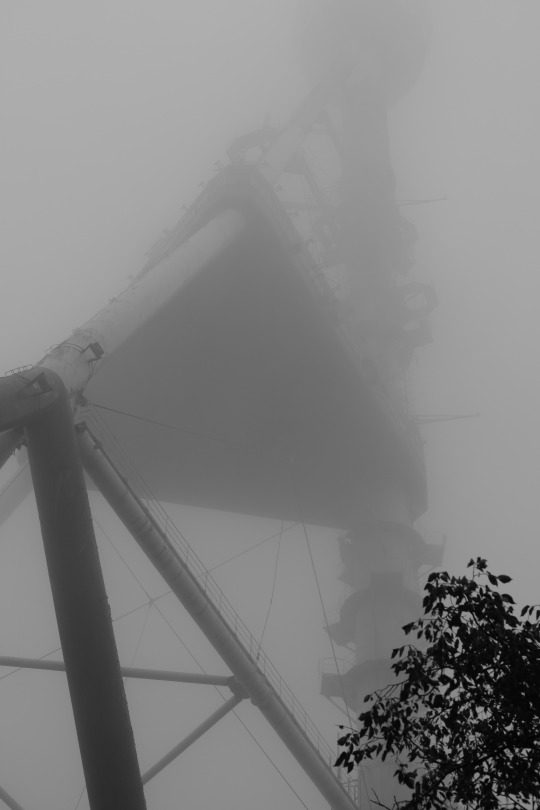


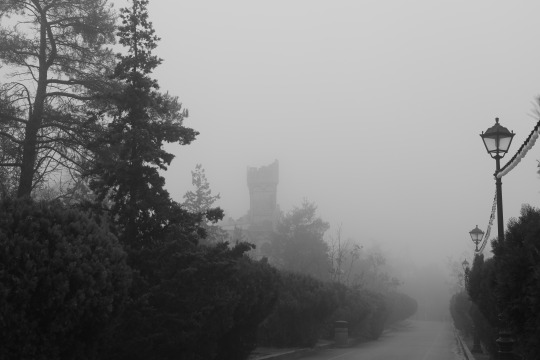

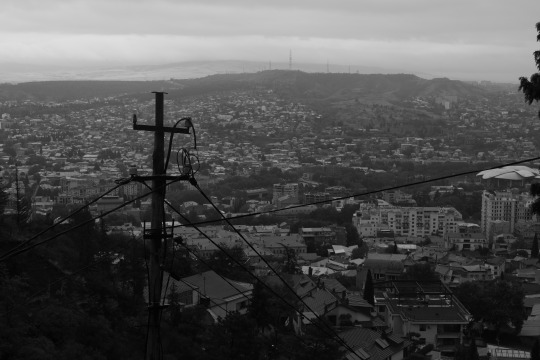

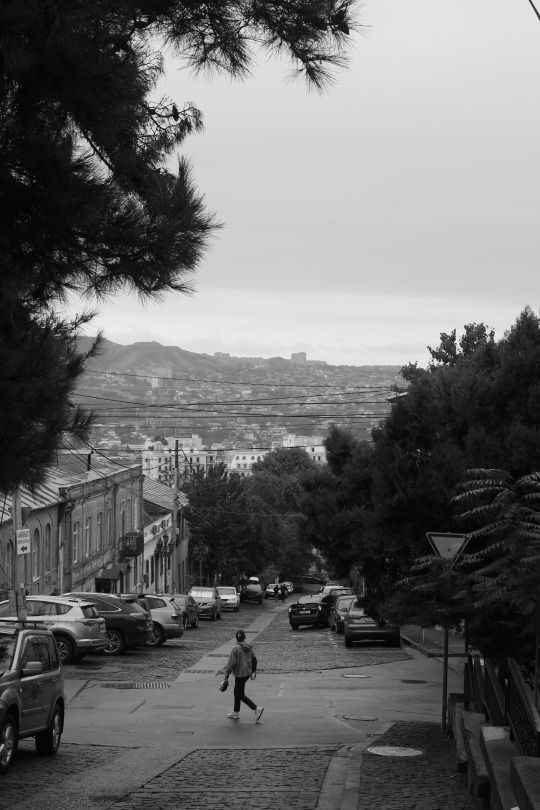

Tbilisi by Dmitry Lakhno
4 notes
·
View notes
Text
ThunderKubrick
#myphotography#photography#tbilisi#my photography#nightphotography#timelapse#thunder#thunderstruck#lightnings#black and white photography
7 notes
·
View notes
Text
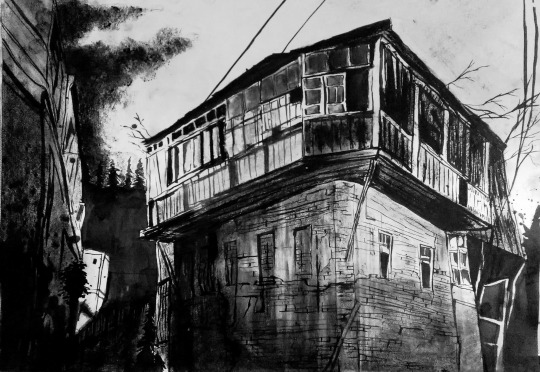
Old house
https://www.instagram.com/millikodea/
#art#contemporary art#illustration#oldcity#tbilisi#street sketch#urban farming#urban sketch#urban sketching#old house sketch#black and white#black and white sketch#pencil#charcoal#charcoal sketch#architecture
9 notes
·
View notes
Text

WATAIN live in Tbilisi on September 28th, 2024
0 notes
Text



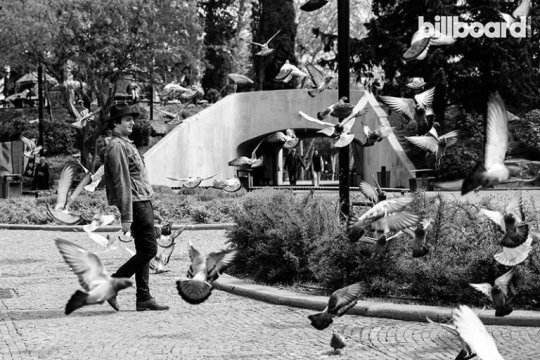
"If I needed a person, it is only to share joy with him. If I ever thought I needed someone, it was only because I was in a good mood"
me on Billboard Georgia
0 notes
Text
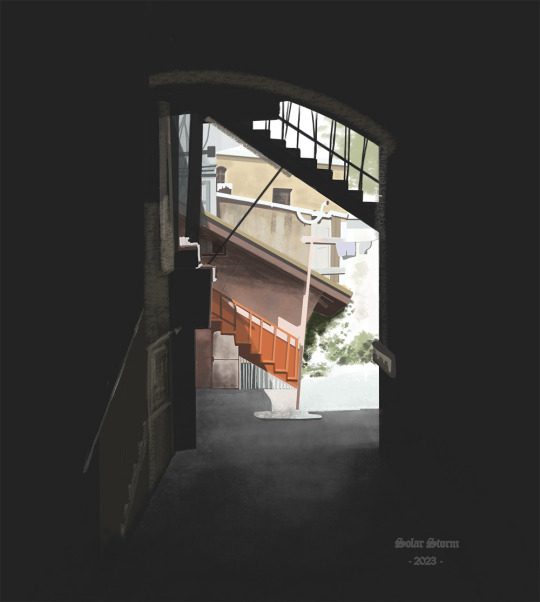
-- Tbilisi Courtyard --
#Digital#2D#Architecture#Lighting#Realism#NoAI#digitalart#painting#drawing#acrylic#ipad#procreate#realism#black#yellow#orange#poster#post card#courtyard#Tbilisi#architecture#sunlight#stairs#house#building#roof#arch#wall#green
1 note
·
View note
Text

First post for the first time in five years. By the way, the photo was taken by my 5 year old son 🥲
1 note
·
View note
Text
Gold Lion Figurine from Georgia (South Caucasus), c. 2300-2000 BCE: Georgia contains one of the oldest prehistoric gold mines in the world, dating back to about 3400 BCE; researchers also believe that the Greek legend of the "Golden Fleece" was inspired by the goldsmithing traditions found in Georgia

The peoples of Georgia (the country, not the state) have been extracting and processing gold for many thousands of years. Georgia is even home to the oldest known gold mine in the world -- a site known as Sakdrisi, where there is evidence of gold mining operations dating back to about 3400 BCE (roughly 5400 years ago).
Sadly, the prehistoric gold mine at Sakdrisi was damaged (and largely destroyed) in 2014, after a Russian mining company (RMG Gold) was given permission to resume its own mining venture on the site. The full extent of that damage has yet to be determined.
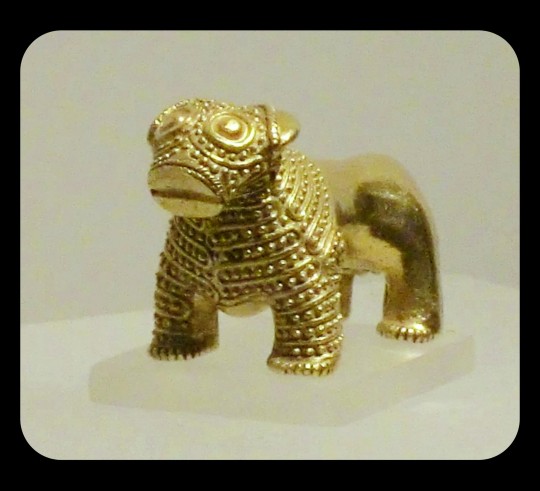
The Tsnori Lion: this figurine dates back to the Bronze Age in Eastern Georgia; it is one of the many artifacts that have come to represent the history of goldsmithing in this part of the Caucasus
The goldsmithing traditions of Georgia also continued to flourish during antiquity, and the ancient Kingdom of Colchis (in what is now Western Georgia) was renowned for both its wealth of gold and its skilled goldsmiths. To the Greeks, Colchis was also known as the homeland of the fabled Golden Fleece -- the treasure sought by Jason and the Argonauts during their mythical voyage into the Caucasus, as described in the Greek Argonautica.
It's believed that the legend of the Golden Fleece may have had at least some basis in reality. Ethnological and historical accounts indicate that the peoples of Colchis/Georgia traditionally used sheepskins to sift for gold in the rivers of the Caucasus; during that process, the fleece would slowly become encrusted with tiny particles of "gold sand," until it eventually took on the appearance of a "golden fleece." Additional research has confirmed that the rich alluvial deposits found within the region certainly would have been sufficient to have produced this "golden fleece" effect.
Researchers believe that those customs may have given rise to the Greek legends about the Colchians and their Golden Fleece -- legends that ultimately evolved into the story of the Argonautica.
The unique goldsmithing traditions of Georgia played an important role in the cultural/political development of the South Caucasus, and those traditions are reflected in the wealth of golden artifacts that have been found throughout Georgia (and elsewhere).
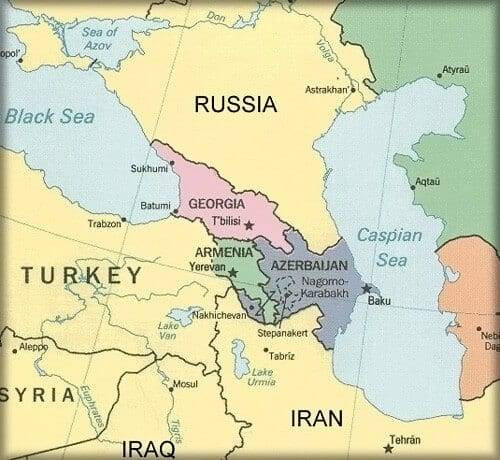
The Location of Modern-Day Georgia: as this map illustrates, Georgia is nestled right at the crossroads between Europe and Asia, with the Black Sea located on one side and the Caspian not far from the other; it is bordered by Russia to the North and Turkey, Armenia, and Azerbaijan to the South
Sources & More Info:
Quaternary International: A modern field investigation of the mythical “gold sands” of the ancient Colchis Kingdom and “Golden Fleece” phenomena
Archaeo Sciences: Bronze Age Gold in Southern Georgia
Britannica: Archaeologists uncover traces of Bronze Age gold workshops in a cemetery near Tbilisi, Georgia
BBC: Artefacts from the world's oldest gold mine
UW Jackson School of International Studies: Georgian environment, heritage at risk as RMG Gold exploits Sakdrisi
UTA Department of Slavic & Eurasian Studies: Ancient Georgia - crossroads of Europe and Asia
Atinati: The Golden Kingdom of Colchis
The Past: Georgia's Treasures: from the Land of the Golden Fleece
National Geographic (Georgian): Golden Lion from Kakheti
Smithsonian: Why this Ancient Civilization Fell Out of Love with Gold for 700 Years
National Geographic's "Out of Eden Walk:" Treasures of the Caucasus
Democracy & Freedom Watch: What was lost when a mining company destroyed the ancient Sakdrisi site?
#archaeology#history#georgia#caucasus#transcaucasia#sakartvelo#artifact#art#lion#iberia#colchis#golden fleece#jason and the argonauts#greek mythology#ancient greece#bronze age#chalcolithic#prehistoric#gold#goldsmithing#conservation#sakdrisi
63 notes
·
View notes
Text
WIP Wednesday!
Thanks @gracieispunk for tagging me!
Here's what I've got so far for our hopeless idiots in The Princess and The Duke:
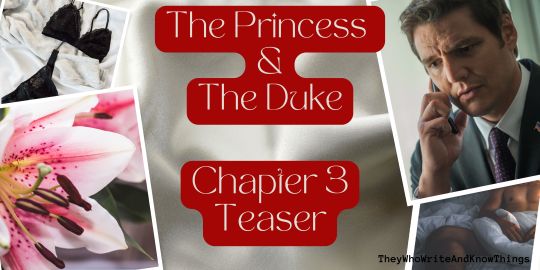
Dave hopes Luna likes lilies, he’d seen the bouquet at a local florist, purchasing it on a whim as he thought about how much your mom might like it. He was really trying, especially since she’d clearly taken a break from Bryce.
But your mom was in one of her usual moods, punishing Dave for her mistakes, for the fact she wouldn’t be able to see Bryce for some time. So, the flowers had gone unnoticed, or actively ignored, so naturally, his thoughts drifted back to Luna.
Because if not her, then it would be you, and he can’t let those thoughts take root. He had taken a photo of the single stem, choosing the prettiest of them all, and snapped away for over an hour. As long as the job goes well tomorrow, he’ll be home by dinnertime. He wonders if you’ll be home, you’d been texting frequently throughout the business trip and he justifies it by telling himself he’s just trying to be a good stepdad.
“Hey there Daddy, you miss me?”
Dave’s mind goes blank as he discards all thoughts about his life at home as he reclines on his bed in his hotel room in Tbilisi. Luna has recently started calling her viewers Daddy and it nearly gave Dave an aneurism the first time he heard it. She’s dressed in Dave’s favourite set, the black lacey thong and matching bra with peekaboo slits. Her nipples are already stiff and inviting.
“You bet I did baby.”
Dave hums under his breath as he pulls his dick out of his sweatpants, it’s too hot and he wishes he were nude, but after the incident in Borneo he was never sleeping commando on a mission again.
“I’m missing you so much,” She says with a soft coo as she pouts at the camera, “Haven’t gotten laid in weeks, these toys just don’t cut it.”
Dave watches in reverence as Luna goes through her new routine, with a generous sprinkling of Daddy added in for effect. He comes hard over his fingers and abs, breathing heavily as he hears Princess Luna come undone as well. A name falls from his lips without thinking, your name, but it’s not until he’s coming down from his high the realisation hits him. He’s thinking less and less about Princess Luna when he watches her, and more and more about you.
No Pressure Tags!
@beskarandblasters @beefrobeefcal @jksprincess10 @wannab-urs @atinylittlepain
#pedro pascal#pedro pascal characters#fanfic#smut#ao3 fanfic#dave york pit#dave york#dave york fanfiction#equalizer 2#dave york smut#dave york x female reader#dave york x reader#dave york x you#dave york x ofc#dave york x oc#forbidden fruit#tw stepcest#stepcest cw#stepdad#stepdaughter#soft!dave york#dom!dave york#soft dom!Dave York#longing#vi writes#my writing#wip#wip wednesday#current wip#the princess and the duke
15 notes
·
View notes
Text

Tina Kazakhishvili,Tbilisi, Georgia
@ombre-ame upload
#black and white photography
14 notes
·
View notes
Text
Georgia is home to 11 endangered languages, according to UNESCO. Like standard Georgian, three of these belong to the Kartvelian language family. But unlike the country’s primary language, Megrelian (or Mingrelian), Svan, and Laz do not enjoy official status or protection. Nor are there official figures on the exact number of speakers, due in part to persistent fears that promoting smaller Kartvelian languages could fuel linguistic nationalism or, worse, separatism. For Georgians, separatism is not an abstract concept: the country fought bitter wars in the early 1990s in Abkhazia and South Ossetia, two breakaway regions that Russia occupied as the result of another war in 2008. Moscow’s habit of instigating and exploiting separatist sentiment in neighboring countries only causes more concern. That said, language advocates maintain that their cause has nothing to do with secession and everything to do with preserving Georgia’s cultural heritage.
This story first appeared in The Beet, a weekly email dispatch from Meduza covering Central and Eastern Europe, the Caucasus, and Central Asia. Sign up here to get the next issue delivered directly to your inbox.
In July 2023, a new translation of the Bible was released in Georgia — the first edition ever published in the Megrelian language. Completed at the independent initiative of Giorgi Sakhokia, a 75-year-old Megrelian speaker, the translation sparked debate on social media. Since the Bible is already available in the Georgian language, critics wondered, why is this translation necessary at all?
Like Georgian, Megrelian is part of the Kartvelian language family, along with Svan and Laz. While many linguists consider these separate languages, Georgians often refer to the latter three as dialects. But the mutual intelligibility between Megrelian and Georgian is very low, Thomas Wier, an assistant professor of linguistics at Free University of Tbilisi, told The Beet.
According to the 2021 Caucasus Barometer survey, seven percent of Georgians speak Megrelian in daily life. The number of Megrelian speakers in Georgia is estimated at around 300,000 people, most of whom reside in the western Samegrelo region on the Black Sea coast. Yet, the language has no official status and, as a result, remains primarily a spoken language, seldom used in writing.
Melor Shengelia was born in Samegrelo’s regional capital, Zugdidi, and has spoken Megrelian with his family since childhood. But his younger relatives are no longer learning the language, he says. The generation of children growing up in the region today are becoming what’s known as “passive speakers,” meaning their parents speak to them in Megrelian, but they respond in Georgian — the language they see in the media, speak with friends, and study in school.
“[Parents] prefer that their kids know Georgian, and kids prefer to know English to use TikTok. [...] Everything is in English or in Georgian,” said Maka Chitanava, who’s also from Zugdidi and speaks Megrelian with her close family members.
The declining use of Megrelian has led UNESCO to designate the language as “definitely endangered.” This classification signifies that children “no longer learn the language as a mother tongue at home,” raising fears that it may eventually disappear.
“My nephews are seven or eight years younger than me and when they start speaking Megrelian, it’s so broken, they make so many mistakes,” said Shengelia, who’s 25 years old. “Even though they can understand, they can't speak properly. That means that their children won't be able to speak Megrelian.”
‘Languages die out, domain by domain’
Most Georgians rarely encounter smaller Kartvelian languages in their daily lives. Natia Liluashvili, who grew up in Georgia’s Imereti region, heard Megrelian for the first time while on a school trip to Samegrelo when she was about 14 years old. The fact that she couldn’t understand the language people were speaking around her was a shock.
“When I came [to Zugdidi] and was walking down the street, I knew I was still in Georgia — but people were speaking a different language,” Liluashvili recalled. “I couldn't understand anything.”
She also remembers singing songs in Megrelian at school, although she didn’t understand the words.
Shengelia says he often encounters people in Tbilisi, Georgia’s capital, who are surprised to learn that his family speaks Megrelian at home. “Even though everyone knows that Megrelian people speak Megrelian, it’s still kind of surprising for them,” he told The Beet. “They just don't have that much information about [it].”
Then there’s the fact that the vast majority of Megrelian speakers are bilingual. As a result, they tend to code switch, alternating languages based on the circumstances or listener at hand. Shengelia, who has lived in Tbilisi for six years, typically speaks Georgian unless he meets another Megrelian speaker. In Samegrelo, he uses Megrelian with his family and friends, and in places like the grocery store, but he opts for Georgian when he’s in what he deems more “formal” spaces such as a bank, a government institution, or a hospital.
“Languages typically don't die out all at once. They die out, domain by domain, whether you use it in public, school, or at the doctor’s office,” Wier explained.
Over time, Georgian loan words have also made their way into the Megrelian language. According to Timothy Blauvelt, a professor of Soviet and Post-Soviet Studies at Ilia State University in Tbilisi, this is due to the limited written documentation of the language, which leads Megrelian speakers to fill in their vocabulary gaps with borrowed words.
“This is one of the biggest problems for the Megrelian language. It has so many Georgian and Russian words, even though there are actual words in Megrelian [with] the same meaning,” Shengelia said. “Sometimes when my grandmother and grandfather say [certain] words, I’m surprised; I didn’t think we had a word for that.”
Svan song
Unexpected events can suddenly and drastically alter linguistic communities. The steep decline of the Svan language is a prime example, Wier told The Beet.
In 1987, a series of avalanches devastated Georgia’s mountainous Svaneti region, damaging Svan villages and killing 85 people. The Soviet authorities decided to evacuate 16,000 residents, most of whom were Svan speakers. Around 2,500 families were resettled elsewhere in Georgia, and the Svan language became endangered in a matter of years. The migration of Georgian and Megrelian speakers into Svaneti, who communicate with Svan speakers in Georgian, further exacerbated language loss in the region.
UNESCO classified Svan as “definitely endangered” in 2011. But Wier fears the language is now at risk of going extinct. “If there’s not a systematic sea change for the Svan language in terms of people’s attitudes and in terms of government funding and aid to communities, I think this one will die out, because its current status has just so drastically declined in just the last 30 years,” he said.
Teaching Georgia’s endangered languages in schools is one possible remedy: Chitanava believes that Megrelian should be taught in the Samegrelo region at least. “In Georgian language classes, we could have a few topics devoted to the Megrelian and Svan languages and maybe also Laz,” she suggested. “So kids can understand how these languages are related, what is interesting about these languages, and that it’s [part of] their cultural heritage.”
Georgian President Salome Zourabichvili has expressed support for teaching Megrelian and Svan in schools. But overall, there’s little political will to provide any government assistance for these endangered languages, primarily due to the association of linguistic identity with ethnicity and, by extension, the belief that granting language rights could spark separatist sentiment.
According to Givi Karchava, the co-founder of the Megrelian Language Association, this attitude is one of the biggest challenges his organization faces — besides a lack of funding. “Any type of activity which shows Megrelian as equal to the Georgian language [...] is understood as separatism,” he said.
The prospect of Georgia signing the European Language Charter, which would mandate the necessary steps to protect and promote minority languages, provokes similar concerns, experts told The Beet.
“There’s basically all these fears about the territorial disintegration of Georgia that some people have,” said David Sichinava, an adjunct research professor at Carleton University. The debate around language rights, he explained, triggers anxieties about a possible domino effect wherein minority populations demand greater autonomy. “That’s a challenge that perhaps is causing these languages [to be neglected],” Sichinava surmised.
“My personal opinion is that signing the document [the European Language Charter] or ratifying it is too politically charged and probably will be for a long time,” Blauvelt said.
A historical legacy
The widespread fear of separatism in Georgia stems from recent history, namely, the 1991–1993 Georgian Civil War, which saw intense fighting between Tbilisi and the separatist regions of Abkhazia and South Ossetia, and the 2008 war with Russia, when Moscow occupied the breakaway territories.
These wars significantly impacted the distribution of Megrelian speakers. The hostilities in Abkhazia in the 1990s displaced more than 200,000 people, including tens of thousands of Megrelian-speaking Georgians who fled to neighboring Samegrelo and other regions. The 2008 war also caused large-scale displacement.
Melor Shengelia’s mother fled Abkhazia’s capital, Sokhumi, during the war in the 1990s and then moved to Samegrelo. Shengelia’s grandfather stayed behind to defend the family home. “People have this fear of separatism, [but] they have to remember that Megrelians were the people who were fighting for Abkhazia [to remain part of Georgia],” Shengelia recalled. “They don’t have any intention to separate from the rest of the Georgians.”
That said, the understanding of language as intrinsically linked to ethnicity has deep roots in Georgia, going back to the Soviet Union’s nationality policy, Blauvelt told The Beet. First introduced in the 1920s, this “nation-building” program assigned officially recognized ethnic groups — referred to as “nationalities” — their own territories within the USSR and promoted national languages through culture and education. (This policy was rolled back in the 1930s, giving way to political purges, deportations of groups deemed “enemy nations,” and Russification).
“The Soviet understanding is really still fundamental in shaping the way people view their own identity [and] why they view national identity as something primordial, something unchanging,” Blauvelt explained. “This question of dialect and language, and where these minority languages fit, is so politically charged, because it’s ultimately part of those discourses of ’national greatness’ and national identity.”
The authorities in Georgia haven’t recorded Megrelian speakers as a distinct group since the 1926 Soviet census. And when Russia added this category to its own census in 2010, only 600 respondents identified as Megrelians.
‘We shouldn’t sacrifice our cultural heritage’
Shengelia says it’s fundamentally misguided to fear that promoting Megrelian could lead to separatism. “The Megrelian language belongs to Georgia and all Georgian people. By underlining that it’s only the language of Megrelian speakers, you are promoting this kind of separation,” he argued. “Megrelian speakers don't think that it’s only their language.”
According to Sichinava, activists working to preserve Megrelian and Svan also share this view. “What’s important and what’s so interesting is that none of those activists say that we are different peoples. They say, ‘We want to preserve the language, but we are Georgian,’” he noted.
The Beet’s other sources also felt that identity politics shouldn’t impede efforts to keep Georgia’s endangered languages alive.
Despite the challenges, Chitanava believes that shifting attitudes in recent years may increase the odds of maintaining Georgia’s language diversity. “Thirty years have already passed since our independence and our war in Abkhazia. I think this pain and fear of the country’s disintegration is less [prevalent],” she told The Beet. “We shouldn’t sacrifice our cultural heritage to these fears and phobias.”
Although not a Megrelian speaker, Liluashvili said that she supports initiatives to preserve the language — including the possibility of teaching it in schools — because it’s part of Georgia’s heritage. “It's our culture. Especially when we are such a small country, we should protect and save our diversity,” she said. “Language is one of the most important parts of diversity.”
For now, however, efforts to preserve Georgia’s smaller Kartvelian languages are concentrated at the grassroots level. In 2018, software developer Hary Kodua created an online Megrelian-Georgian dictionary to make the language more accessible to young people. At this writing, the dictionary contains 120,000 words.
In 2020, Givi Karchava and Giga Kavtaradze founded the Megrelian Language Association with the goal of “saving the Megrelian language from disappearing.” Today, the group publishes Megrelian-language books, runs a magazine, and coordinates seminars.
Megrelian and Svan self-study books are also available, as is a Megrelian version of Wikipedia and translations of well-known fiction, such as the Georgian epic The Knight in the Panther’s Skin.
Karchava himself translated George Orwell’s Animal Farm and Antoine de Saint-Exupéry’s The Little Prince into Megrelian. “Georgian society and the state are more tolerant toward the Megrelian language now,” he told The Beet. “Let’s see what happens next. We are full of hope.”
8 notes
·
View notes
